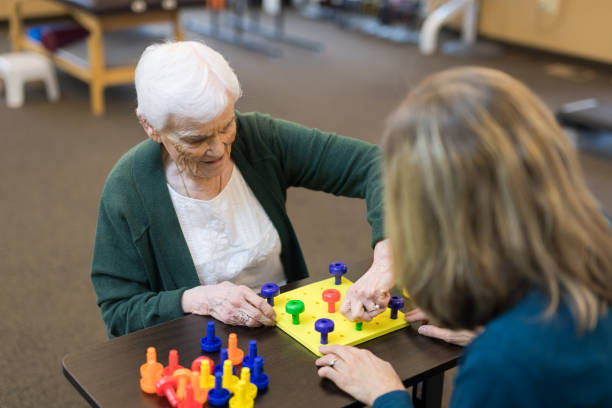As the population ages, maintaining cognitive health in seniors has become a crucial area of focus. Cognitive decline, often associated with aging, can significantly impact the quality of life, making it essential to explore ways to keep the mind sharp and active. Stimulating activities, ranging from physical exercise to engaging in puzzles or learning new skills, play a pivotal role in preserving cognitive function.
This blog post delves into various strategies and activities to help seniors maintain their mental agility and overall well-being.
Contents
Benefits of Stimulating Activities for Cognitive Health
Engaging in mentally stimulating activities can yield numerous benefits for seniors, helping to slow down the cognitive decline associated with aging. These activities can improve memory, enhance problem-solving skills, and boost overall brain function, thereby promoting a higher quality of life and increasing independence.
Physical Exercise
Engaging in regular physical exercise has been shown to have substantial benefits for cognitive health. Activities such as walking, swimming, and tai chi improve cardiovascular health and increase blood flow to the brain, enhancing its function. Exercise helps reduce the risk of developing cognitive decline and dementia, making it a vital component of a senior’s routine.
Mental Exercises and Puzzles
Mental exercises like puzzles, crosswords, and Sudoku are excellent for keeping the mind sharp. These activities challenge the brain, promoting the growth of new neural connections. Seniors who consistently engage in mental exercises are better equipped to maintain their cognitive abilities and delay the onset of cognitive decline.
Lifelong Learning
Lifelong learning involves continuous engagement in educational activities and acquiring new skills. This could include taking up a new hobby, learning a musical instrument, or attending workshops and classes. By continuously challenging the brain, lifelong learning helps preserve mental agility and cognitive function.
Social Engagement
Social interactions are crucial for maintaining cognitive health. Participating in community activities, joining clubs, or simply spending time with family and friends can markedly reduce the risk of cognitive decline. Social engagement stimulates the brain, providing it with diverse and enriching experiences that contribute to mental well-being.
Healthy Diet
A balanced, nutritious diet plays an essential role in maintaining cognitive function. Like the Mediterranean diet, diets rich in antioxidants, omega-3 fatty acids, and vitamins support brain health. Seniors should focus on consuming a variety of fruits, vegetables, whole grains, and lean proteins to nourish the brain and body.
Stress Management
Chronic stress can adversely affect cognitive health, increasing the risk of cognitive decline. Techniques such as meditation, yoga, and deep breathing exercises can help seniors manage stress effectively. By incorporating these practices into their daily lives, seniors can improve both their mental and cognitive well-being.
Incorporating these activities into daily routines can significantly enhance cognitive health in seniors, ultimately leading to a higher quality of life.
Creating a Balanced Routine for Cognitive Health

Establishing a balanced routine that encompasses various stimulating activities is essential for maintaining cognitive health in seniors. By incorporating a mix of physical, mental, and social activities, seniors can create a holistic approach to preserving mental agility.
Structured Physical Activities
Having a structured exercise regime ensures that seniors consistently engage in physical activities. Setting aside specific times each day for activities like walking, yoga, or swimming can help make exercise a regular part of life.
Mind-Engaging Hobbies
Encouraging seniors to take up mind-engaging hobbies is another way to promote cognitive health. Activities such as painting, knitting, and gardening not only offer mental stimulation but also provide a sense of accomplishment and satisfaction.
Educational Pursuits
Seniors can greatly benefit from educational pursuits, which stimulate the brain and foster continuous learning. Enrolling in community college courses, participating in online learning platforms, or joining book clubs are excellent ways to keep the mind active.
Social Activities
Incorporating social activities into the routine helps combat loneliness and provides mental stimulation. Regular coffee meetups, game nights, and club memberships can ensure ongoing social engagement.
Balanced Diet Plans
Planning balanced meals that focus on brain health nutrients is crucial. Seniors should consult with dietitians to create meal plans rich in antioxidants, healthy fats, and essential vitamins.
Stress-Relief Practices
Embedding stress-relief practices into daily routines can enhance cognitive health. Activities like meditation sessions, tai chi classes, or even scheduled relaxation times can help manage stress levels effectively.
Consistent Reviews and Adjustments
Regularly reviewing and adjusting the routine ensures it remains effective and enjoyable. This could involve tracking progress, seeking feedback from healthcare providers, and making necessary changes to keep the activities engaging.
By creating and maintaining a balanced routine that integrates these various activities, seniors can better manage their cognitive health, ultimately leading to a more fulfilled and independent life.
Conclusion
As we age, it is essential to prioritize activities that stimulate the brain and promote cognitive health. Incorporating physical exercise, mental challenges, lifelong learning, social engagement, a healthy diet, stress management techniques, and creating a balanced routine can significantly enhance cognitive well-being in seniors. By making these activities a regular part of life, we can help seniors live longer, healthier lives and maintain their cognitive abilities for as long as possible.
If you are in need of physical, occupational, or speech therapy services, please contact us at (920) 252-4442. We look forward to hearing from you.
